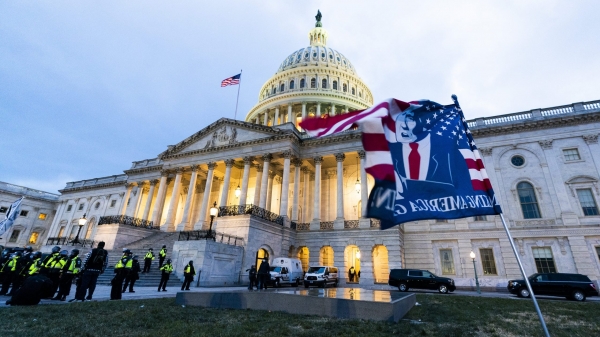Alabama’s drinking water is safe, so there’s no need to hoard cases of bottled water during the coronavirus crisis, according to the Alabama Department of Environmental Management.
“With so many things Alabamians have to worry about – their jobs, social distancing, the welfare of loved ones, gathering food and other necessities – the safety of their drinking water shouldn’t be one of them,” said Lance LeFleur, ADEM’s director. “The water they get from their tap, whether it’s from a large municipal system or a small, rural utility, is 100 percent safe due to the proven safety requirements they are required to follow and that ADEM enforces. People don’t need to fear the coronavirus as far as their water is concerned.”
LeFleur in a statement from his office points out that the disinfectants used in the water systems—as standard operating procedures kill viruses, including COVID-19. It is also a standard operation of municipal wastewater systems to kill any viruses before the treated water is discharged into Alabama’s rivers and streams.
“ADEM, through its permitting and inspections, is making sure the drinking water systems, as well as wastewater systems, abide by the appropriate, stringent clean water standards,” LeFleur said.
In a letter sent to Gov. Kay Ivey, on Friday, U.S. Environmental Protection Agency administrator Andrew R. Wheeler emphasized the importance of the public having confidence in their water supply during the novel coronavirus outbreak.
“Ensuring that drinking water and wastewater services are fully operational is critical to containing COVID-19 and protecting Americans from other public health risks,” Wheeler said. “Handwashing and cleaning depend on providing safe and reliable drinking water and effective treatment of wastewater.”
Wheeler also said the U.S. Department of Homeland Security recognizes water and wastewater treatment workers and their suppliers as essential critical infrastructure workers and urged state and local officials to “ensure that these workers and businesses receive the access, credentials, and essential status necessary to sustain our nation’s critical infrastructure.”
LeFleur agrees with Homeland Security’s designation of essential workers.
“From an environmental standpoint, nothing is more important than maintaining clean drinking water,” he said. “While coronavirus does not in itself pose a threat to our drinking water, nor to our wastewater treatment systems, it would be impossible to fight the virus without clean water. Our water systems and their employees are essential, and from our standpoint, so too are the people, our people, whose job is to make sure those systems are safe and well-maintained.”
Aubrey White heads the drinking water branch of ADEM’s Water Division, which oversees municipal and rural water systems as part of the agency’s authority delegated by the EPA to carry out the provisions of the Safe Drinking Water Act in Alabama. ADEM does this through enforcement of regulations, construction and operating permits, robust monitoring and reporting, and frequent inspections of the nearly 600 public water systems in the state.
“Obviously, this is a huge responsibility given us, and we take that responsibility very seriously,” White said. “Even as a lot of business and state agencies have curtailed activities due to COVID-19-related mandates, we must continue the monitoring, inspections, reporting and enforcement of the regulations that help ensure our water is clean and safe and will remain clean and safe.”
An example of ADEM’s continuing efforts to safeguard public health is the State Revolving Fund (SRF), through which the agency provides low-interest loans to public water, wastewater and stormwater management systems to pay for infrastructure improvement projects. Three such projects recently were awarded funding by ADEM totaling millions of dollars and are currently in the public comment period – $1.25 million to the Grand Bay Water Works Board in Mobile County for a new wastewater treatment unit; $1.2 million to Phenix City for a sanitary sewer lift station; and $462,000 to Spanish Fort to restore and improve a drainage canal.
“Some of these projects might not be possible if not for the financial assistance we help provide,” said Kris Berry, chief of ADEM’s State Revolving Fund section. “These projects were proposed by the local authorities based on what they need to maintain and improve their safe water managing systems, reviewed by our staff and opened to the public to weigh in.”
Created by 1982 Law
Making sure our drinking water is safe is just one of the many vital roles ADEM performs. Protecting the state’s air, water and land by enforcing state and federal rules and regulations is why ADEM exists.
ADEM traces its roots to the Alabama Environmental Management Act, passed by the Alabama Legislature in 1982 to create a comprehensive program of environmental management for the state. The law created the Alabama Environmental Management Commission and established ADEM as the vehicle to absorb several commissions, agencies, programs and staffs that had been responsible for implementing environmental laws. ADEM, with 575 employees at its headquarters in Montgomery and regional offices in Birmingham, Decatur and Mobile, administers all major federal environmental laws. These include the Clean Air, Clean Water and Safe Drinking Water acts and federal solid and hazardous waste laws.
During the current health crisis, LeFleur said his agency is following the new mandates issued by Gov. Kay Ivey and the state health officer to curtail the spread of COVID-19, which means some employees are working remotely. However, ADEM offices are operating under normal business hours while adhering to social distancing guidelines.
“All essential functions of the department are being performed,” the director said. “All citizen complaints received by ADEM will be investigated, and they can be submitted and tracked electronically. In addition, ADEM staff is readily accessible, and public contact is available seamlessly by phone and email.”
ADEM’s website, www.adem.alabama.gov, provides plenty of useful information, LeFleur said. Website visitors can keep up with current issues, including notices, comment periods and contact information, as well as enforcement actions.
If past public health and public safety crises are an indication, ADEM could be called on to help in another way. ADEM trucks and vehicles are available to the Alabama Emergency Management Agency to transport medical supplies and other uses. LeFleur said those vehicles helped transport supplies following the Gulf oil spill as well as in the aftermath of hurricanes and tornadoes that struck the state.
Helping Protect Jobs
LeFleur said ADEM continues to work with local economic development offices concerning new industry. These efforts help protect current jobs and provides assistance to industry that create new jobs. In addition to the current SRF loan projects, other programs through which ADEM provides assistance include scrap tire cleanups, unauthorized dump cleanups, recycling grants, water and air quality monitoring, weather forecasting, underground storage tank monitoring and cleanups, anti-litter campaigns and brownfield cleanup program.
“The fact is, we are doing a lot that the public is not aware of to assist businesses and local governments,” LeFleur said. “That is especially important now when everyone is eager for the coronavirus crisis to end and for people to go back to work.
“That is not to say, however, that we are going easy on them. To the contrary, if they violate their permits and regulations and cause environmental harm, rest assured we are going to hold them accountable. Our job one is protecting Alabama’s water, air and land resources, and by extension public safety. That is what we are continuing to do.”



















































